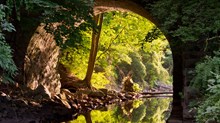After the Burn
Mom always told me not to play with matches. But today, I'm starting fires.
It's late in the morning, and already there's a charred ruin behind me. Smoke … so thick I can barely breathe. Flames lick the sides of the little prairie. Crackle-crackle! Pop! It sounds like a catfight in a brown paper bag. The fire gulps and swallows everything in its path.
The wind suddenly shifts, and the flames roar toward me. Ashes float through the air. Heat scorches my face.
This spring I'm helping burn the natural areas at my local arboretum. Last fall I spent two days in training classes, then took a rigorous certification test so I wouldn't burn down anything I wasn't supposed to. I learned about wind shifts, the action of fire, the right conditions in order to burn, and how to stay out of the way of flames.
It all culminated here, today, when I donned a yellow fire suit, strapped on a backpack water sprayer, and headed off with the hired crew to help set things aflame.
Visitors to the arboretum—some horrified, some intrigued—stop to watch. Others attempt to continue their routine walks, which take them into the path of the smoke and flames. Part of my job is to keep an eye out for people who move into danger and keep the area clear. Another is to explain why we burn.
Although our fires are intentional, burning the land is a part of the natural cycle God set in motion with creation. Lightning strikes once set the prairies of Illinois ablaze, wiping away the old brush and weedy growth and warming the earth for the richly diverse wildflowers and grasses to sprout and grow. They erased an old version of the landscape, leaving it an empty blackboard, ready to chalk the sums of a new growing season upon it.
When civilization got a toehold, well-intentioned settlers suppressed the fires. Without the flames, the native plants were strangled. Prairies filled with brush and trees. Wildflowers diminished.
When fire did break out, it ran wild, fueled by too many years of built-up tinder. Pick up the newspaper and you'll see the effects of wildfires. They're destructive, frightening things. Often, they're tragic. Yet, the burned-over land recovers, coming back as a new landscape full of surprises.
Flames often sweep over my life. Sometimes, I see them coming. Other times, they catch me unaware. It might be a bout of depression that leaves the landscape of my life desolate and ashed. I've been blindsided by the sudden death of friends, loved ones who have cancer, the ravaging effects of bad decisions I've made that come back to blister and singe.
After the burn on the prairie, we leave behind a landscape of charred, smoking earth. Nothing, it seems, could ever grow here again. Yet, soon comes a sprinkle of rain. A week passes, and green shoots push through the ashy ground. Another week. And another.
Pale pink shooting stars and buttery yellow wood betony begin to bloom. Grasses determinedly head for the sky. Killdeer scratch nests and lay their camouflaged eggs on the ashes to create a new generation of life on the prairie. Without the fires, the land never fully becomes what it was created to be.
In the third chapter of Exodus, Moses saw a bush ablaze and removed his sandals. He realized he stood on holy ground, in the very presence of God. God went on to lead Moses and the Israelites through the desert, appearing to them at night as a pillar of fire. In the second chapter of Acts, the apostles gathered together after Jesus' death. Tongues of fire descended on them. This fire symbolized his presence through the Holy Spirit with them to the end of their days.
Fire is a powerful symbol. God is with us.
I don't believe God causes these fires that scorch the soul. Rather, I ask: Can the desolation of our lives become holy ground? Is God with us when our lives are nothing but charred, smoked cinders? Can he bring something new and beautiful out of the devastation?
Some of these fires in my life smolder on and on. Others burn hot and fast, and then … they're gone. Purged of anything growing or lovely, my life stops for a while. I go through the motions. And I wonder if my life will ever be the same again.
Of course, it won't be. But the prairie fires give me hope … hope that beautiful things are waiting to be released under the blackened surface. Will life be richer? It seems impossible. But I believe. I sit in the ashes, and I wait for what's on the other side.
Copyright © 2010 by the author or Christianity Today/Kyria.com.
Click here for reprint information.
Read more articles that highlight writing by Christian women at ChristianityToday.com/Women
 Read These Next
Read These Next
 Renewing Our VowsThis simple act of recommitment can remind you why you married in the first place
Renewing Our VowsThis simple act of recommitment can remind you why you married in the first place
 Seeing Our Parents HomeThe painful privilege of caring for aging and dying parents
Seeing Our Parents HomeThe painful privilege of caring for aging and dying parents








 Homepage
Homepage